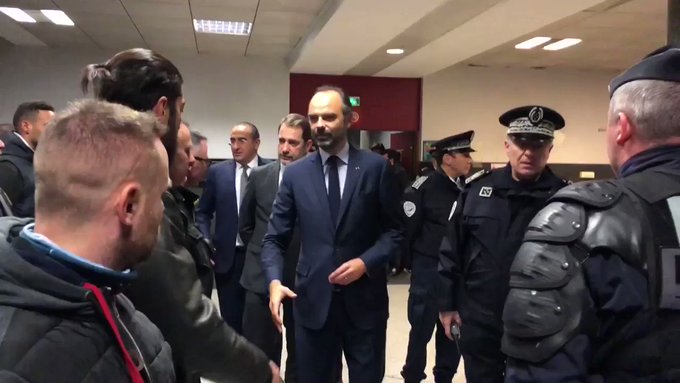 In recent weeks, a new protest movement called the “yellow jackets” took to the streets of France. They are protesting the rise of petrol prices, issued by President Emmanuel Macron in order to cut CO2 emissions.
In recent weeks, a new protest movement called the “yellow jackets” took to the streets of France. They are protesting the rise of petrol prices, issued by President Emmanuel Macron in order to cut CO2 emissions.The yellow jackets movement, seemingly spontaneously born on the internet, immediately spread on a national scale. It brought hundreds of thousands of peo ple on the streets of Paris on November 24. The protesters are worried because rising petrol prices will directly affect their everyday life.
French interior minister does not rule out imposition of emergency to face protests "yellow jackets"
French Interior Minister Christophe Castaner did not rule out the imposition of a state of emergency in the country at the request of a number of unions and police to counter the "yellow jackets" protests since 17 November.
French Interior Minister Christophe Castaner said in response to a question on how to counter the protests of the Yellow Jackets and the possibility of imposing a state of emergency in the country at the request of a number of unions and police on Saturday night, he was ready to consider the possibility of imposing them to enhance security in the country.
"We are considering all measures that will allow us to take further measures to ensure security," the minister told France's AFPM television on Saturday. "Anything that allows for enhanced security is not forbidden to me and I am ready to look at everything."
France imposed a state of emergency after bloody attacks in Paris in 2015. It was also imposed after riots in the suburbs in November 2005.
In the same context, the 52-year-old Kastaner said the perpetrators of the violence in Paris on Saturday were "divisive". "About 3,000 people have been identified in Paris and committed irregularities," he said.
"All police, gendarmerie and civil security vehicles were mobilized today," the French official who was appointed head of the interior on October 16, replacing former minister Gerard Colomb, said Saturday that 4,600 policemen and police had been deployed in the capital.
The police union "Alliance" on Saturday evening requested the imposition of the state of emergency also proposed by the Union of National Police Commissioners.
"We are in a state of disobedience," said deputy head of the second largest police union, Frederic Lagash. "We must act firmly," he said. The Alliance said in a statement that it demanded "the strengthening of the army to protect the institutional sites and allow the mobile intervention forces to move."
"In the face of disobedience movements, exceptional measures must be considered to protect citizens and ensure public order, and the state of emergency is part of this," the National Police Commissioners Union wrote.
"The police refuse to act as tools because of waiting strategies that only encourage the enemies of the republic," she said in a statement. And demanded that "the government has the courage to take the procedures allowed by the law and the Constitution and up to the imposition of a state of emergency."
For his part, French President Emmanuel Macaron confirmed that he would never accept "violence" which broke out Saturday in Paris on the sidelines of a protest movement of the "yellow jackets", because it "has nothing to do with the expression of legitimate anger." "The perpetrators of these acts of violence do not want change, they do not want any improvement, they want chaos, they are betraying the issues they claim to exploit and exploit," he said.
French Prime Minister Edouard Philippe said his government was committed to dialogue and stressed the need to respect the law and expressed shock at the attack on French symbols. Philippe said the total number of protesters across the country was 36,000, including 5,500 in Paris.
Police said they arrested about 205 people, while more than 65 people, including 11 security forces, were injured, amid fears that groups of the far right and the far left would infiltrate the "yellow jackets" movement.
Police also recorded the construction of 582 roadblocks in France, while Nantes airport in western France was briefly closed after the protesters reached the runway and landing.




